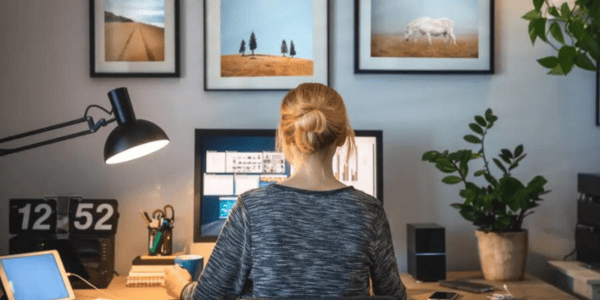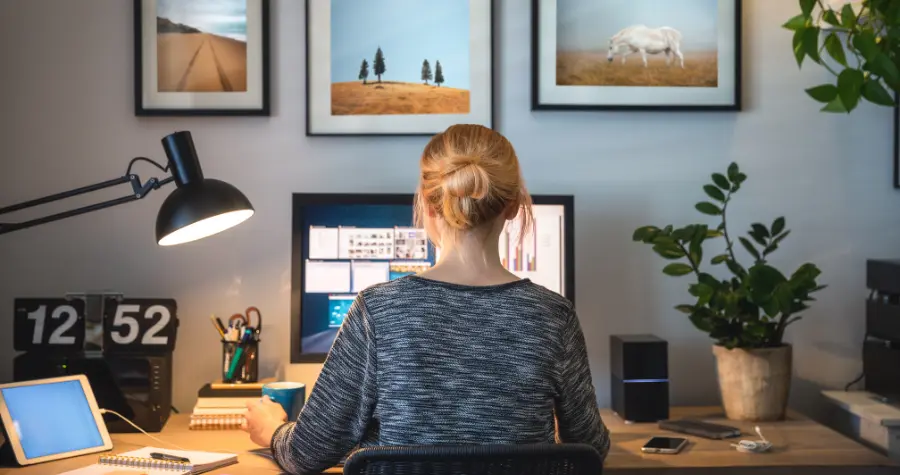Get to grips with hybrid working: learn from 8 of the biggest brands
.png)
Hybrid working: it’s here to stay.
Since the big C-word, the well-being of staff has been the top priority for many big brands, especially when it comes to flexible working. Hybrid working has seen a massive increase in popularity since the pandemic, and it shows no signs of slowing down.
Yet, transgressing from a fully office-based brand to one that hybrid works may seem daunting. You may have worries or concerns that it just won’t work for your business, your team won’t be productive, and they’ll lose the collaboration and buzz of working directly with their team in an office.
That’s why looking at what the big brands do is so important in understanding the real-life pros and cons of hybrid working.
What is hybrid working?
Hybrid working is when you work some days at home, and some in the office. It’s about getting the best out of both worlds, whether it’s one, two or four days in the office. It allows you to be flexible with your weekly schedule, enhancing the positive work/life balance we all aim for.
Read more: 9 ways to support your hybrid workforce

If you’d like to find out how you can best support your hybrid workforce, download our hybrid working brochure, or get in touch today for your free consultation with one of our Merchandise Consultants.
Get to grips with hybrid working: learn from 8 of the biggest brands
If you’re intrigued by what hybrid working actually looks like, here are 8 of the biggest brands in the world that have embraced hybrid working since the pandemic and have made it work amazingly. In fact, they’re now the hybrid working gurus of the corporate world.
1. Innocent Drinks
Innocent Drinks are all about keeping those positive vibes going! Flexible working allows them to hire a more diverse workforce and enhance collaboration opportunities for their employees. For them, it’s about making work fit the energy of each team member.
Alice Watkinson, Senior Designer at Innocent Drinks
And at Innocent Drinks, it’s all about understanding how you can use technology to your advantage. It’s about keeping communication open and flexible, and working out what works best.
What you can learn from Innocent Drinks:
The biggest takeaway: if you don’t succeed the first time, keep trying. And switch it up FAST. Don’t dawdle. If something isn’t working, bin it and move on. Keep your hybrid working fresh (just like their smoothies).
2. Patagonia
Patagonia’s founder Yvon Chouinard had one goal when he started his “un-company”: to care.
To care for the planet, but also for customers and employees, too. And for Patagonia, supporting the latter means being flexible with hybrid working.
Employees work a nine-hour day with a three-day weekend every other week. Their employee handbook is entitled, “Let My People Go Surfing” and celebrates the people they hire: people who love the outdoors (and yes, it’s just what you think: if surfs up, out-of-offices are on). And the cherry on top: Patagonia offers in-house childcare.
Dean Carter, Patagonia’s chief human resources
Having such a flexible working ethos means Patagonia reaps the rewards, too. They only have a 4% turnover each year, the retention rate for mothers returning from maternity leave is 100%, and astonishingly many current Patagonia employees attended the childcare as kids. For Patagonia, a happy workforce “do well and do good”.
What you can learn from Patagonia:
Tailor your working schedule to who you’re employing. If you want to be able to hire the best of the best when it comes to talent, then you need to offer flexible working. It’s about balance. Balancing your company goals whilst still allowing your workforce to figure out what works best for them.
Read more: Have you got your hybrid working toolkit sorted?

3. Facebook
Facebook’s approach to hybrid working is to create a balance between what their employees’ job roles require, and the well-being of their staff. If a role can be done remotely, then employees can request a remote working structure, and so far, 90% of requests have been approved.
A Facebook representative
Facebook’s goal when it comes to remote working: have 30,000 employees (half of the company) working from home within a decade.
What you can learn from Facebook:
Allowing changes to the traditional working structure when both the company's and employees' goals align. Perfection doesn’t mean a 9-5 in the office!
Read more: How to support your staff with their mental health

4. Spotify
Spotify has completely embraced the whole ethos behind hybrid working. For them, work is something you do, and not somewhere you go. Their flexible approach allows for a better work-life balance as well as evolving their culture for the better in the long term.
Anna Lundström and Alexander Westerdahl, Spotify HR team
By allowing such flexibility, Spotify has been able to explore new talent pools and retain existing talent at the same time. This enables diversity and inclusion when it comes to their team. They are actively listening to employees for what they want, allowing everyone to reach their full potential.
What you can learn from Spotify:
Trust your team. Communicate. Connect. Hybrid working doesn’t mean less work, it could even mean a better and more productive team.
Read more: Your hybrid working routine with Power a Life
-2.webp?width=600&height=300&name=4%20(1)-2.webp)
5. HubSpot.webp?width=138&height=138&name=96%20(1).webp)
HubSpot are all about results. It doesn’t matter where and when they’re produced, just that they are. Simple. They don’t want to miss out on great people by not adapting, and awesome talent shouldn’t be penalised because of their postcode. And, with a new hire onboarding process that’s fully remote, no one misses out.
Katie Burke
In a nutshell, for HubSpot, work is “not a place”. And we’re all here for it!
What you can learn from HubSpot:
Stop limiting your talent pool by location. Stop limiting your work expectations by numbers in the office. Just stop linking success to geography. It’s so 2019.
6. Google .webp?width=138&height=138&name=97%20(1).webp)
If you want to work at Google AND reap the benefits of a hybrid structure, well, you’re in luck! Google now allows employees to work three days in the office and two days elsewhere every week, plus they can work remotely for four weeks each year. They can also apply to change locations or take the leap and work full-time remotely.
Google CEO Sundar Pichai
However, Google still wants employees to enjoy the facilities of their campuses (great term), but there’s no hard and fast rule that employees HAVE to go. Just, if they want to. Perfect.
What you can learn from Google:
Don’t forget that ‘fun’ is a driving force within any workplace, and that can look different wherever you are. But, when it comes to hybrid working, that means keeping things flexible, easy and breezy. Have options for both preferences and follow your employees' lead.
7. Airbnb.webp?width=138&height=138&name=99%20(1).webp)
Looking back and looking forward simultaneously is no easy task. Yet, that’s exactly the strategy Airbnb took when figuring out their hybrid working plan. They saw what had been popular in the past (following what start-ups were doing) and asked the question - where is the world going?
CEO Brian Chesky
The answer: the world is becoming flexible. And when this was put to the test (thanks again, pandemic) with remote working becoming necessary, it actually proved to be Airbnb’s most productive two-year period in its history.
Now, Airbnb allows hybrid working, working for up to 90 days a year in a different location, and rather than focusing on the number of days spent in an office, they’re prioritising meaningful in-person gatherings throughout the year.
The future really is flexible with Airbnb.
What you can learn from Airbnb:
If you’re worried hybrid working wouldn’t work for you, why not put it to the test? Results speak louder than ‘what-ifs’, so trialling a hybrid working environment could help you see the pros and cons for your specific business.
8. Pinterest.webp?width=138&height=138&name=98%20(1).webp)
Pinterest has gone all out with its hybrid working setup. With PinFlex, employees can work wherever they want. At Pinterest, the work guides the collaboration style.
Christine Deputy, Chief People Officer
The only caveat - employees are expected to visit a Pinterest office once a year. But, besides that, they can come and go as they please, with offices still seen as a hub of creativity, but with no pressure for staff to use them.
What you can learn from Pinterest:
Keep your offices active. Hybrid working doesn’t mean everyone will be working remotely all the time, it just means there’s an option for those who need/want to work away from the office. If it’s within your budget, keep your offices as a hub of creativity and collaboration.
Read more: Our favourite UK-made merch: office essentials
-1.webp?width=600&height=300&name=5%20(1)-1.webp)
Your hybrid working wins
Hybrid working is the future of the workplace, there’s no escaping it and we’re so excited to join you on this journey!
Through collaboration, communication, flexibility (and a splash of good old-fashioned fun), your team are ready to be invigorated. To be empowered. To be trusted. And branded product media will help you along every step of your hybrid working adventure.
Download your free hybrid working brochure now, or get in touch for your free consultation with one of our Merchandise Consultants.


